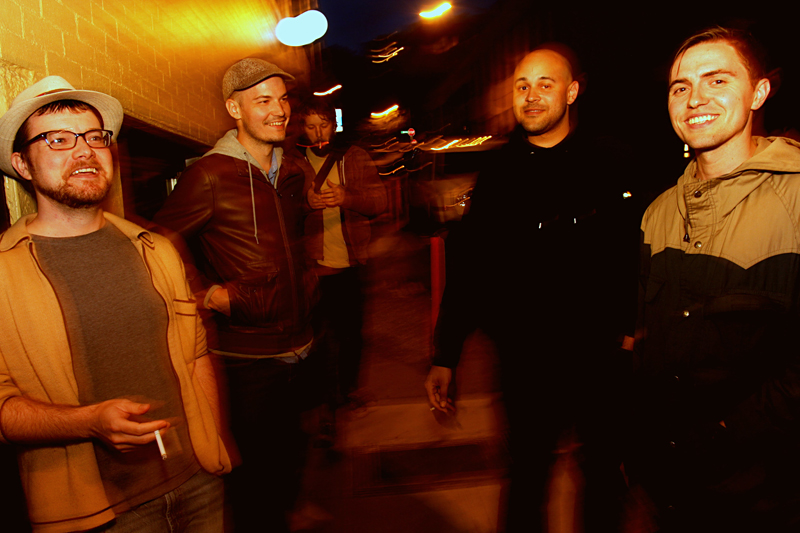Though Tully’s had called the old Rainier Brewery home for years, whatever lingering scent of beer or coffee the colorful building along I-5 ever possessed is now buried beneath the ripening funk of band practice spaces and the thick smell of pot. The halls connecting the musical workshops are decorated with discarded records and dorky headshots of Ann Wilson and The English Beat, giving the space a dilapidated rec-center vibe. Out back, the members of experimental garage-rock quintet Yuni in Taxco are sitting on concrete steps under the highway, drinking tallboys of High Life and catching the last late-evening rays.
They’ve been rehearsing for Saturday’s album-release show for Prizes, the band’s third record of deconstructed, globally influenced psych-pop. The test pressing of the LP arrived earlier today from the Netherlands. The cover, created by local artist Lindsey Rae Gjording, is layers of blue, yellow, and purple light projected through the lacy transparency of a cutout made of Tyvek. The psychedelic undersea world evoked pairs perfectly with the spacey textures of the band’s songs. It’s this unified aesthetic, from their incense-and-tapestry-decorated practice space to their decision to release the album on cassette and vinyl (not CD), that best shows Yuni’s winking talent for straddling the line between retro and edgy.
Like the band’s first two albums, Prizes was recorded in Yuni’s cramped practice space beneath the big T, with guitarist/vocalist/ co-songwriter Sean Beszhak applying his signature minimalistic production work. “Some of the songs are the original demos or live recordings,” he explains. “There’s no preparation.” Rather than tweak the first take and risk losing the raw energy, he adds details as the songs progress. “That’s how we end up with a lot of layers,” he says. “You have to let things manifest.”
There are several Internet rumors about how Yuni came to be. One says they formed on a Mexican vacation. Another claims the character of Yuni appeared in a childhood short story as an “eccentric, free-thinking Thai hippie.” They’re all questionable. The truth is a little more quotidian.
The core songwriting duo, Beszhak and Ross Beamish, met when they played a few solo shows together five years ago. Bound by a mutual affection for odd, adventurous pop, they decided to collaborate, enlisting Beamish’s brother Bryce as the drummer and filling out the lineup with schoolmates and co-workers Jim Saunders on bass and Isaiah Washington on percussion and electronics (including a sweet Roland sampler that functions as a theremin). Beszhak, whose shaggy hair and beard and Kirkland background earned him the nickname the “blond Robin Pecknold,” and Ross, who wears his hair slicked back (a la Boardwalk Empire‘s Michael Pitt) and sports faded tattoos done by Washington, share songwriting duties equally, if somewhat competitively.
“We’ve heard everything the other has done for five years,” Beszhak says. “We share recording equipment—when I turn on the tape player, I hear what he’s done. It is competitive. But there’s no winner.”
As part of the band’s evolution, their songs have gotten longer. Prizes‘ opening track, “Echoes,” clocks in at more than six minutes, and Saunders jokingly describes their increasing song lengths as “tantric.” It’s not a bad metaphor: The songs’ key changes and multipart structures build to climaxes more satisfying than that of your average three-minute radio single.
Bryce is about to bring the group’s aesthetic to its next level: He’s started a label, Havaii Records, to release Yuni’s albums and other projects he believes worthy of support.
“Bryce has already rejected five of my [solo] albums,” cracks Beszhak, who’s recently been on a writing jag inspired by pianist La Monte Young’s minimalist masterpiece The Well-Tuned Piano. He’s led Ross down the same path, and now both are writing long, experimental compositions.
“Sean is like the coach of our band,” Ross says.
“I do move quick,” Beszhak admits with a sheepish grin. “But I don’t know if I move in the right direction.”
As long as he sticks to the current artistic recipe, he’s sure to find a way to make microtones addictively listenable.





